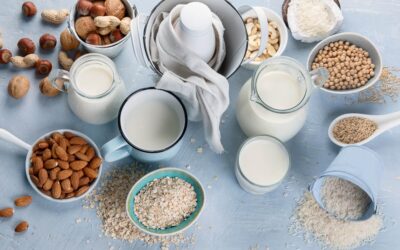If a friend told you that what was once considered a sugary children’s treat is now optimal fuel for athletes, would you believe it? What if the same information came from your coach, a television ad, or a scientific study? You might reconsider. This is one of the dairy industry’s latest projects to sell chocolate milk. The industry has created a massive nationwide campaign to promote chocolate milk as the perfect post-workout beverage, and it’s convinced many to believe this rumor through aggressive marketing and manipulated research. We’ve asked our team of Switch4Good scientists to review the validity of these studies, and just as we thought, there are glaring flaws in the dairy industry’s claims.
Chocolate Milk Studies
Two studies measuring the effectiveness of chocolate milk were conducted in 2015 using climbers and judo athletes. For simplicity, we are specifically addressing the judo study. During the first week, twelve male elite judo athletes drank about four cups of water for the first hour after training. Two weeks later, the athletes continued training but replaced the water with an equivalent amount of chocolate cow’s milk. The athletes’ hormones, mood, soreness, and performance (based on push-ups and a sport-specific fitness test) were measured. Researchers found that when athletes drank chocolate milk, they experienced less mood disturbance, improved performance, and a decrease in cortisol.
Our scientists found more than a few issues with this. First, the study was not a blinded study nor did it include a calorically equal control group. The researchers claim that it was impossible to use a double-blind design due to the color and flavor of the milk, but other researchers have proven that such a study is possible. The purpose of blinding is to eliminate bias. Without blinding, the findings must take into account that the participants’ results may have been influenced by hopeful, encouraging researchers and expectant, enthusiastic participants.
Comparing Chocolate Milk to Water
Second, chocolate milk was compared to water rather than a comparable calorie-rich beverage. This is to assume that judo athletes only consume water after a workout, which is simply unrealistic. Athletes consume sports drinks or a post-workout meal, so the water comparison is not applicable in a real-world setting. Yes, chocolate milk outperformed plain water, but how does it compare to calorically matched food or drink? In fact, a recent study explored the effects of whey protein versus rice protein in mixed martial arts fighters and found no difference in body composition changes. It is highly likely that simply consuming protein and carbohydrates was responsible for chocolate milk’s “superior” performance in this study. These papers provided no evidence that chocolate milk offers any additional performance or recovery benefits.
Further, the judo athletes were instructed to avoid “milk-based beverages” for the duration of the study. This leads us to question why. Is it because consuming more daily protein would have negated the effect of chocolate milk? Or is it possible that consuming more than one liter of dairy a day could lead to gastrointestinal issues and worse performance? Shouldn’t a post-workout fuel be safe and not so limiting? We believe so, and dairy apparently doesn’t fall into this category.
Finally, and most importantly, the study participants lost 1.5 more pounds on average, drinking water instead of chocolate milk. This makes sense since chocolate milk contains far more calories than water. Because aggressive weight loss worsens performance, it is no wonder that chocolate milk outperformed water. Again, researchers may not have seen any benefit to chocolate milk if they had compared it to a comparable beverage.
What does this study really tell us? That chocolate milk slows weight loss and improves performance relative to water. That’s nothing revolutionary. Cow’s milk, even the chocolate variety, is not a health food, and it is not the key to athletic success.
Want to learn more about how cow’s milk affects the body? Check out our improved health page.








